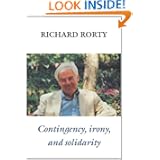 “Keeping faith with Darwin,” progressive pragmatist Rorty (1931–2007) wrote, means realizing that “our species, its faculties and its current scientific and moral languages, are as much products of chance as are tectonic plates and mutated viruses.” (Richard Rorty, “Untruth and Consequences,” a review of Killing Time by Paul Feyerabend, in The New Republic, July 31, 1995).
“Keeping faith with Darwin,” progressive pragmatist Rorty (1931–2007) wrote, means realizing that “our species, its faculties and its current scientific and moral languages, are as much products of chance as are tectonic plates and mutated viruses.” (Richard Rorty, “Untruth and Consequences,” a review of Killing Time by Paul Feyerabend, in The New Republic, July 31, 1995).
Remember this when Darwinists, Christian or otherwise complain that people misunderstand them, that Darwinism isn’t really all just about chance and chance alone.
Darwinism IS really all about chance and chance alone.